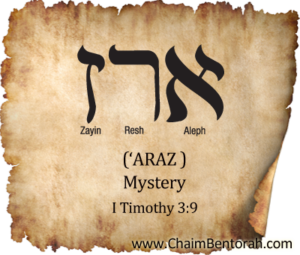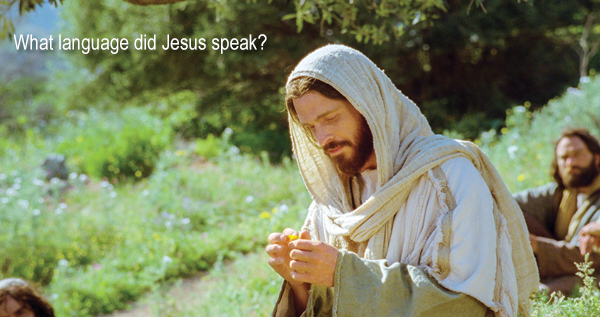Aramaic Word Study – Mystery – ‘Araz – Aleph Resh Zayin
I Timothy 3:9: “Holding the mysteries of the faith in a pure conscience.”
 It seems like every Bible student, pastor and teacher has chimed in on this verse with their idea of what the Apostle Paul was talking about when he speaks of the “mysteries” of the faith. Many never stop to consider the word “mystery” and automatically think in terms of, you know – Agathe Christie. A Bible student will look at this word in the Greek and find the word “musthrion” which has the idea of “close kept” or “secret.” A Bible College or Seminary professor will check the Septuagint and discover that “musthrion” is used for the Hebrew word “sod” which means secret.
It seems like every Bible student, pastor and teacher has chimed in on this verse with their idea of what the Apostle Paul was talking about when he speaks of the “mysteries” of the faith. Many never stop to consider the word “mystery” and automatically think in terms of, you know – Agathe Christie. A Bible student will look at this word in the Greek and find the word “musthrion” which has the idea of “close kept” or “secret.” A Bible College or Seminary professor will check the Septuagint and discover that “musthrion” is used for the Hebrew word “sod” which means secret.
None of that really helps me; at least, in understanding what Paul was talking about. There is just one thing many Christians do not examine when they see the word “mystery” and that is the fact that Paul was a Jewish scholar and theologian and he would have viewed this word in his native language of Aramaic which is the word ‘araz and means a scholar and/or prominent person. Paul was both. He was not only a scholar but had been a member of the elite Sanhedrin, a prominent person. To him, a scholar was the academic of his day, and for a Jew, it would be what we call today a theologian or a religious scholar.
To most of us the word “puzzle” and “mystery” mean the same thing. However, in academic circles, there is a major difference. Paul is not saying our faith is a puzzle, but a mystery. When you do a crossword puzzle there is satisfaction along with frustration. Even when you can’t find the right answer, you know it exists. Puzzles can be solved, they have answers. A mystery does not offer such comfort. It poses a question that has no definitive answer because the answer is contingent upon a future interaction of many factors, known and unknown. A mystery cannot be answered; it can only be framed, by identifying the critical factors and applying some sense of how they have interacted in the past and might interact in the future. A mystery is an attempt to define ambiguities.
You see the Apostle Paul was merely saying what an orthodox rabbi once said to me when I wanted to learn the mysteries of God. “I can’t teach you, you must learn yourself.” In Christianity, and I find particularly in the Western Christianity, we have a tendency to go from fad to fad. God moves and reveals Himself in a certain way through a certain expression of worship. It is really effective and wonderful, you feel the presence of God, and you experience the miraculous, but before long some start to grow bored with that form of worship. The spontaneity wanes and in desperation, the leaders begin to program this worship and write out a script to follow. The faithful doggedly stay with the script hoping to recapture that glow they once felt. Along comes some new prophet with some new revelation on worship and prayer and then people are flocking to this, getting all excited, feeling like they are on the cutting edge. Before long that wears thin, the leaders panic and start scripting it.
This is what rabbinical teaching tells us the mysteries of our faith is all about, what Paul was most likely referring to. You see our faith is very fluid, we are always moving from glory to glory. As some of you know, I recently spent a week living in silence at a monastery down South. I spent that time studying, worshipping, praying etc, the whole ball of wax. Although I have been a Christian for over half a century, I felt like I was just learning how to pray and how to worship. God is leading me into worship and prayer far different from anything that I have yet to experience. Now, I could have returned from my week of silence and said: “Mercy Maude, I’m into something new. I need to write another book, start barnstorming and see if I can get anyone interested in a dusty old professor to deliver a sermon or two. Maybe I can gather our All Access members and start a new church online and have some serious prayer and worship with this something new. I will write it all out, step by step, follow the checklist and you too can get your prayer answered.” But you see the critical element of the word muthrion, sod and/or ‘araz is that you cannot script it out, you cannot write a book, or preach a sermon on it. When a man is intimate with his wife, he is not about to go around blabbing all the secrets he shares to enter this intimacy with his wife. What goes on between a man and his wife is muthrion (Greek), sod (Hebrew), and/or ‘araz (Aramaic). That is why Scripture teaches the God of Abraham, the God of Isaac, and the God of Jacob, not the God of Abraham, Isaac, and Jacob. That is why David often says: “My God,” He is no one else’s God, at least not in the way He is intimate with each one of them. The same way that He is your God, Jesus is your Savior.” He is your personal God and you are God’s personal child as if you were the only one in the Universe to make that claim.
As I returned from my week of silence, I listened to a classic song from the old Hit Parade. It kept repeating the words, “All of me, why not just take all of me.” At first, I thought God was telling me he wanted all of me. Then I realized He was asking me to take all of Him. To do that means I must step out into uncharted territory. I must blaze a trail no other believer has gone down because there has been no other person like me in a relationship with God like I have. Just as there has been no other person like you, in a relationship with God like you have. He is an infinite God, He made no two people alike, He wants a special relationship with you and you alone. It is time to blaze a new trail with God, and walk down a new path that no one else has ever walked. That is the ‘azar, the mystery of our faith. To you personally, it is no mystery, just to everyone around you.
PLEASE LEAVE COMMENTS BELOW. THAN YOU!
Hi there! Thank you for reading this Daily Word Study. Can I ask a favor? Share this Daily Word Study with your friends on Facebook and Twitter by clicking one of the icons below.
Thanks & Blessings, it means a lot to me!








Loving your insights.
Blessings from Kenny
Invercargill New Zealand
thanks for all the studies moreh CHAIM..ALL YOUR ARTICLES AER READ AND PONDERED DAILY BY THE A FAMILY(FAMILY OF 5)WE JUST CHERISH EACH AND EVERY TEACHING
Wow I am so blessed to get your daily sharings. Love the way you share it. It opens doors for me. And love how you dig deeper, which encourages me to do the same. God Bless You Always. JLU always
This insight is perfect for me at this moment. Thank you for loving our God and speaking forth His Word to us.
Perfect Word for me today.
Thank you!
Good word
Professor Chaim! I was born of the Spirit almost five years ago, and upon my conversion I sensed the Spirit leading me to leave the job I had at the time. After much prayer, meditation, and eventually confirmation, I left my job (and pretty much everything else) not knowing where I was going, what I would be doing, or how things would turn out for me and my family (I’m married with four kids). My wife took it upon herself to provide financially for the household these past few years, but as her body/health was starting to deteriorate I couldn’t help but to feel like the decision was a mistake; like I let Elohim down, myself down, my wife and my children down. Fast forward to about a week ago. I’m down in spirit, my family is struggling, and I have no money. I’m seriously considering going back to work at this point, as the calling and purpose He has led me into appears to be slowly fading away. I pray and seek His face for comfort and direction, and He answers me in graceful ways only He can. My departure from my job and the culmination of me ending up with basically no money (and not much else) I’m sure is a mystery to many. It was a mystery to me, but not anymore. I’m moving forward and staying the course, “holding the mysteries of the faith with a pure conscience.” I’m at peace with my decision. My conscience is clear. There will be no turning back. Shalom Professor.
Thanks for sharing!
2 Thessalonians 3:10
Bro. Benjamin, your spirituality is commendable, and yet YHWH is also practical. Continue your devotion to Yeshua and go to work so you can provide for the family He’s blessed you with.
Thank you so much!
Thank you, Bro Chaim. I have subscribed to your Hebrew Word Study. I have learned much. As I journey with God, I have tried to imitate other preachers’ approach to deepened my relationship with God. I failed to succeed so far. It is true each of our relationship with God is unique. It took me so long to realize that. I am enjoying Him more and more in my unique way with Him. Thank you again. God bless you.
What a fantastically wonderful insight! That opens up a new and beautiful relationship with God….Thank you for sharing Azar – the mystery of our faith – May God reward you all-ways
So good. Thanks!
Thank you for this teaching. I understand it now. And I admit I have done exactly what you stated. I share them, thinking they may “help” someone to experience His presence as I did. Sometimes that “may happen” such as what you just shared did with me!!! Makes me think about the white stone with a new name for me on it. If I even got that correct. I always thought it’s a new name that HE is giving me, and no one will know it but me and Him.
Thank you Chaim for all your word studies. It is a blessing and this one on araz is special.